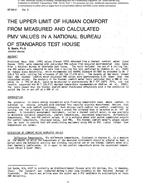
SF-86-01-3 — The Upper Limit of Human Comfort from Measured and Calculated PMV Values in a National Bureau of Standards Test House
- Comments Off on SF-86-01-3 — The Upper Limit of Human Comfort from Measured and Calculated PMV Values in a National Bureau of Standards Test House
- ASHRAE
Predicted Mean Vote (PMV) values (Fanger 1970) obtained from a thermal comfort meter (Lund Madsen 1976) were compared with calculated PMV values from measured environmental data taken from a National Bureau of Standards test house. The tests included the use of a ceiling fan. The PMV values were compared to data from a ceiling fan test performed by (Rohles et al. 1983) at Kansas State University, which recommended the ASHRAE Standard 55-1981 be extended to 85 F (29.4 °C) with ceiling fan airspeeds of 200 fpm (1.016 m/s). The results of the tests showed that the thermal comfort meter displayed PMV values were approximately 0.33 lower than the calculated values. The analysis of the thermal comfort meter tests indicated that a PMV-of one, which is a PPD of 26.8, could be maintained to approximately 86 F ET* (30°C ET*), and- the results supported the 85 F (29.4°C) maximum temperature recommendation (Rohles et al. 1983). The tests showed that the thermal comfort meter functioned effectively with a fan controller to switch the fan on and off at a PMV of +1.
Units: Dual
Citation: Symposium, ASHRAE Transactions, 1986, vol. 92, pt. 1B, San Francisco
Product Details
- Published:
- 1986
- Number of Pages:
- 11
- File Size:
- 1 file , 1.1 MB
- Product Code(s):
- D-SF-86-01-3

